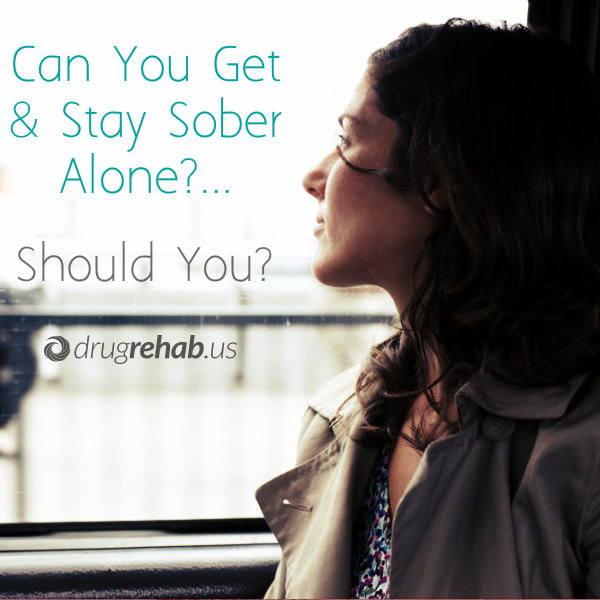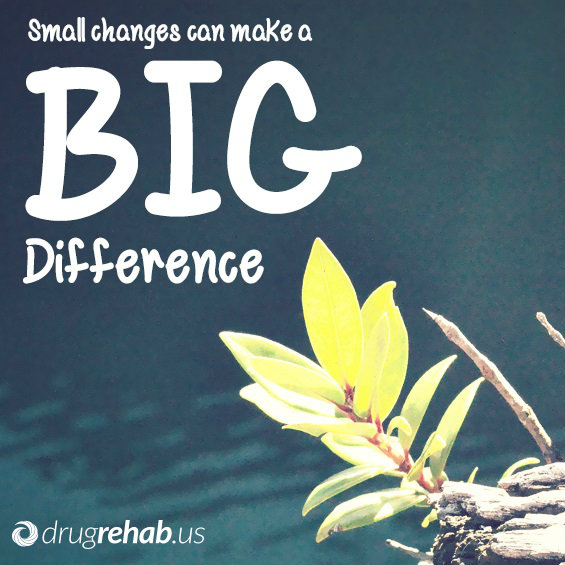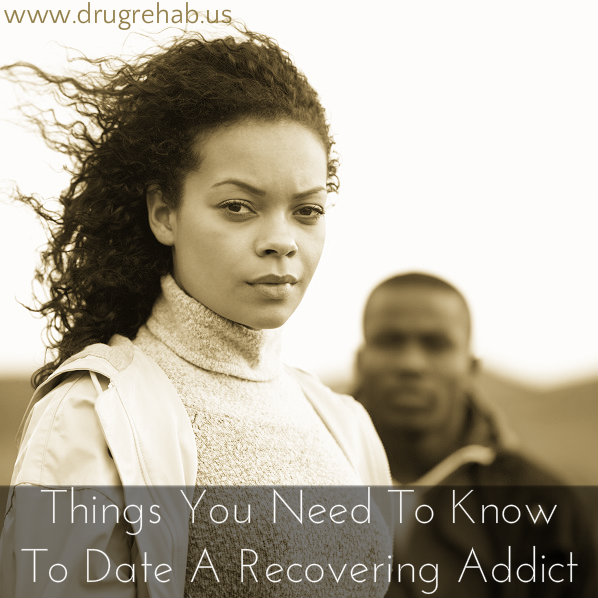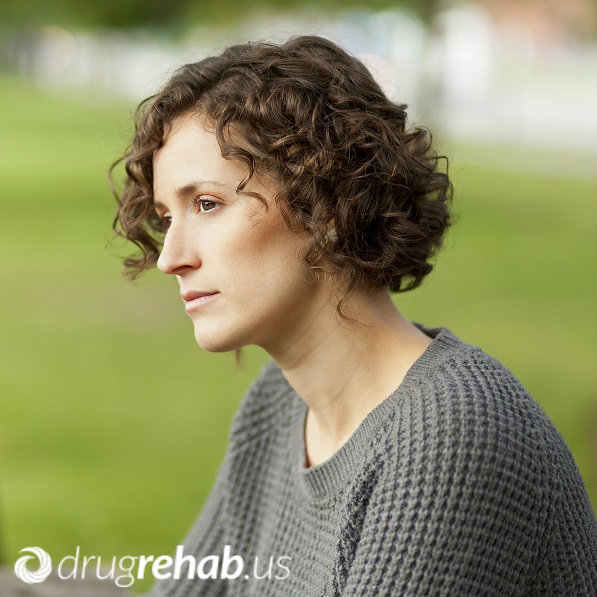25 May 2015
Can You Get Sober And Stay Sober Alone?
You’re determined to get over your problem with addiction. You’ve had enough of the horrible way alcohol and/or drugs are making you feel and the damage you are constantly doing to the people you love. You have lost jobs, relationships and maybe your reputation because of your drinking and drugging. You might even have some health concerns caused by addiction.
People are encouraging you to go to a treatment center. You want to stop your self-destructive tendencies but you don’t want to go anywhere. You are sure that you can quit any time you want to and you’re just about ready to prove it. You don’t believe you need anybody to show you how. You just need to stop using alcohol and drugs.
Powerful Hold Of Addiction
 It’s the great delusion of almost every addict or alcoholic that he or she has the freedom to choose to quit. The truth is that once you are addicted, it’s highly unlikely that you will be able to discontinue using your drug of choice without help. Drugs and alcohol are physically and mentally addicting. Mind-altering substances create a compulsion to continue their use even when they are destroying you.
It’s the great delusion of almost every addict or alcoholic that he or she has the freedom to choose to quit. The truth is that once you are addicted, it’s highly unlikely that you will be able to discontinue using your drug of choice without help. Drugs and alcohol are physically and mentally addicting. Mind-altering substances create a compulsion to continue their use even when they are destroying you.
The reason you can’t quit has little to do with lack of willpower. Drugs cause chemical changes in the brain that lead to craving. You are compelled to keep repeating the experience of getting high even when all the important things and people in your life are slipping away. It’s true that you may be able to quit for short periods of time, but you can’t seem to stay stopped. You are compelled to keep returning to a life of active addiction.
Why You Should Ask For Help
Getting sober requires much more than simply making up your mind that you want to quit. Withdrawing from certain chemicals, including alcohol, can be dangerous and possibly even life-threatening, and should usually be done under medical supervision. Getting through withdrawal is only the beginning. Once you have safely detoxed from chemicals, you have to learn a whole new approach to life and you will need the help of others to do that.
Up to now you’ve been in the habit of running from problems and uncomfortable emotions. With the help of other people, you can learn to cope with the stressors of life without turning to chemicals.
Having the help of people who share their experiences of living a sober life with you will make your journey much easier than it will be if you try to figure everything out on your own. When you go to meetings and reach out to others in recovery, they can tell you the mistakes they have made along the way as well as the things they have learned that have worked.
Remaining Vigilant To Recovery
The best way to get sober is to have the help of others to get through detox and early sobriety. As time passes, it’s equally important to remain connected to others on an ongoing basis and to remain aware that there is always the possibility of relapse.
Even though you’ve broken the cycle of daily habitual use of your drug of choice, you may find that you suddenly experience the compulsion to pick up a drink or a drug after you’ve been sober a while, and this may happen when you least expect it.
Addiction can be compared with other relapsing diseases such as diabetes or heart disease. There is no graduation date and no point at which you are cured. You have to keep doing whatever it takes to stay sober, and that includes going to meetings and staying connected to other people.
Recovery from drugs and alcohol is definitely possible, and in most cases, successfully recovering on a long-term basis is done by surrounding yourself with other people who truly understand.
Your support network can include a sponsor, friends both inside and outside of recovery circles and possibly counselors or addiction professionals. Those who follow the 12 steps of recovery believe that there is strength in numbers and are aware that each of the 12 steps includes the words “we” or “us.” Together we can do what none of us can do alone.
Discover 5 Tips To Understand Addiction And Quit Unhealthy Habits!
30 Apr 2015
Will You Be Successful In Drug Rehab?
Admitting that you have a problem with drug use and that you need treatment for it are big steps to take. You should be commended for coming to this realization and for getting out of the shadow of denial. The next logical step is to go through some kind of rehab or treatment for drug addiction. It’s normal if you are feeling worried about it or if you are concerned that you’ll fail. Drug rehab statistics are unclear on how many people are successful on their first try, but the only way you’ll know is if you go through with it.
What Happens In Drug Rehab?
 To give yourself the best chance of success at rehab you need to have a positive attitude and the commitment to do the work needed to get better. It also helps to know what to expect. Every rehab facility is different and has its own policies and treatment methods. To really know what to expect, talk to someone in admissions and ask all the questions you have about what will happen once you get there.
To give yourself the best chance of success at rehab you need to have a positive attitude and the commitment to do the work needed to get better. It also helps to know what to expect. Every rehab facility is different and has its own policies and treatment methods. To really know what to expect, talk to someone in admissions and ask all the questions you have about what will happen once you get there.
In general, you can expect to have to go through detox, although some facilities will require that you do that before entering. You should also have one-on-one counseling sessions, group support and any number of other activities that promote a healthy, drug-free life after rehab. You should also have a treatment plan that is tailored for your particular needs.
How To Do Well In Rehab
Drug rehabilitation statistics show us that no matter how good rehab is, many addicts will relapse afterward. This doesn’t necessarily mean failure. What it means is that addiction is a chronic disease that requires ongoing treatment. Nevertheless, you can make the most of your rehab experience to give yourself the best chance of avoiding a later relapse.
Make a commitment to the process and devote yourself to the work that the professionals ask you to do. When you aren’t sure about a part of the process, ask questions. Open up fully to your therapists and counselors, and also to your fellow patients. Being open will help you heal and help you make new friends. Rely on the support of your family and friends, even if they can’t be in rehab with you. You will need them when you complete your program.
What About Outpatient Treatment?
Rehab is not the only option for drug addiction treatment. If your life circumstances don’t allow you to spend weeks or months in a rehab facility, you can get treatment that works with your schedule and that allows you to stay home. Statistics for outpatient drug rehab success rates are minimal, but it does work for many people. One benefit is that you can stay with a friend or with family members who care about you and support you.
Whatever kind of treatment you choose for your addiction, the important thing is that you get care. No one can battle addiction alone, and the only way to be successful at being sober is to get the help you need and to ask for support when you need it.
Believe In Yourself. Remember…Small Changes Can Make A Big Difference!
Anyone who has ever had a pet knows the healing power of animals. Having a pet makes you feel needed and loved. A pet provides you with a responsibility outside yourself. Animals lower your blood pressure, relax you and help you cope with stress.
It should come as little surprise to hear that pets can be great partners in drug and alcohol rehabilitation. Rehab statistics regarding pets as part of treatment are minimal, but as animal therapy becomes more popular, they are sure to show that pets are a positive part of addiction treatment.
Animal-Assisted Therapy In Addiction Rehab
 Using animals in therapy isn’t a new concept, but it hasn’t been applied to addiction treatment for very long. Therapy animals (which are most often dogs but can also include cats, horses and other animals) are often used in situations and settings where people need comfort.
Using animals in therapy isn’t a new concept, but it hasn’t been applied to addiction treatment for very long. Therapy animals (which are most often dogs but can also include cats, horses and other animals) are often used in situations and settings where people need comfort.
Nursing homes, hospitals, hospices and various types of residential homes allow certified therapy animals to be brought in to bring comfort, stress relief and a distraction to patients and residents.
Drug rehab statistics do not have much to say about animal therapy playing a role in treatment. This is changing, though, as facilities and caregivers realize just how beneficial animals can be to any healing process, including addiction treatment.
Benefits Of Pet-Therapy
Spending time with and petting an animal has many benefits, including:
- lowered blood pressure
- reduced anxiety
- a stabilized mood
- better anger management
- improved self-esteem and
- lower tension and stress
All of these benefits can help an addict in recovery heal and can also reduce the risk of having a relapse.
Are There Any Inpatient Rehabs That Accept Pets?
Rehab facilities are using animal-assisted therapy more and more in treatment for addiction. Field trips to visit therapy horses or visits to the rehab facility from therapy dogs are becoming more common and are great ways to help addicts feel better. However, most rehab centers will still not allow a personal pet to come along for a patient’s stay.
This doesn’t mean it is impossible. There are some enlightened locations that realize just how important pets are in people’s lives. Therapy animals are great, but to have your beloved pet beside you as you get treatment is even better. If you search, you can find facilities that will allow you to bring your companion animal.
If you’re wondering what happens in drug rehab and you’re nervous about going in for a residential stay, knowing that animals will be a part of the program can be a big relief. Animals bring comfort and a feeling of unconditional love and loyalty. They won’t judge you and will make you feel better just by letting you pet them.
If you can bring your own pet to rehab and therapy, you are lucky. If you can’t, you can still benefit from spending time with the dogs and other animals trained to work as animal therapists.
Healing Is Possible!
You just started seeing this great guy. You went on a few dates, and they were some of the best dates you’ve ever experienced. You’re thinking this could be serious. This could be the real deal. And then he drops the bombshell: he’s a recovering addict. Do you run away or do you take a chance on this guy who seems so wonderful?
Things You Need To Know To Date A Recovering Addict
Before you make a choice to continue or break it off, there are some important things you need to know.
Recovering Addicts Can Be Great Partners
 If your mind is flooding with negative thoughts and all the possible things that could go wrong in dating a recovering addict, you haven’t considered one thing: recovering addicts have been through intensive therapy. They have learned important skills for having healthy relationships, like how to communicate effectively and how to cope with stress in positive ways. Addicts in recovery have committed to sobriety and to being honest. These aren’t terrible traits to have in a partner.
If your mind is flooding with negative thoughts and all the possible things that could go wrong in dating a recovering addict, you haven’t considered one thing: recovering addicts have been through intensive therapy. They have learned important skills for having healthy relationships, like how to communicate effectively and how to cope with stress in positive ways. Addicts in recovery have committed to sobriety and to being honest. These aren’t terrible traits to have in a partner.
Addicts In Recovery Relapse
No matter how strong the commitment to sobriety, addicts in recovery are likely to relapse at least once. It’s important that you understand addiction is a chronic disease, which means that relapse is possible. Be realistic about this fact and decide if you are prepared and willing to help your partner through a difficult time. Will you be ready to support him after a relapse? Will you be able to cope with seeing him under the influence?
A Recovering Addict’s Past Is Shady
So your new guy dropped the bomb that he is an addict in recovery. That is likely to be the first of a few bombshells. He gave you the big one, and he probably won’t give you all the other details of his past right away. You will need time to process and get ready for the next. Many addicts have shameful things in their pasts. He was dependent on drugs, and he may have done other things he now regrets. Be prepared to hear that he hurt people, that he has a criminal record or that he did other bad things. Then remember that the past is in the past. He can’t change the past, but he can make amends.
Recovering Addicts Require More Support
In any relationship you need to support your partner. Your recovering addict will need more support than most partners would. He may need you to refrain from drinking around him. He may not be able to go to parties without you by his side. You may need to make allowances for him to go to meetings or therapy when you would rather do something else. Doing these things means supporting him in his sobriety. He needs this extra support to have a strong sobriety and to avoid relapse. Be prepared to give and to be more sensitive.
Love Isn’t Always Enough
Perhaps the most difficult lesson about addiction and dating is that love really doesn’t conquer all. You may fall hard for this guy and be prepared to take on his past and his recovery, but your relationship might still fail. Maybe he will relapse and become a different person, stealing from you or getting violent. Maybe you will find that the level of support he needs is more than you can give. If you are prepared for all of these possibilities, then you may be ready to start dating an addict in recovery. Remember to take care of yourself and not to lose who you are in the process of being with a recovering addict.
Are You Enabling Your Partner’s Addiction? – Learn The Signs Of Enabling & How To Stop!
05 Mar 2015
Should I Go Back To Rehab?
Relapses are common for anyone struggling with a chronic disease, whether it is diabetes, high blood pressure, addiction or any other. By definition, a chronic illness is one that can’t be cured and requires continuous treatment. Not keeping up with treatment means risking a relapse. As an addict, this doesn’t mean that you always have to be in intensive therapy, but you need to be aware of your feelings, your moods and your cravings and up your treatment as necessary.
Factors To Consider When Deciding If You Should Go Back To Rehab
Whether you need to return to rehab after a relapse is a personal choice, but there are several factors anyone should consider.
Can You Afford Rehab?
 In a perfect world, your health care needs would come first and all other considerations would be secondary. The truth is you have to think about practical issues. Rehab isn’t like going to the doctor for a checkup or to change your prescription. It means taking time from work and family to spend weeks or months in a facility working on just you and your illness. Look at your finances, your health insurance if you have it, your job situation, and talk to your family. From this information you can determine if you can practically afford rehab for a second or third time.
In a perfect world, your health care needs would come first and all other considerations would be secondary. The truth is you have to think about practical issues. Rehab isn’t like going to the doctor for a checkup or to change your prescription. It means taking time from work and family to spend weeks or months in a facility working on just you and your illness. Look at your finances, your health insurance if you have it, your job situation, and talk to your family. From this information you can determine if you can practically afford rehab for a second or third time.
Consider Your Rehab Options
Another thing to think about is where you would go if you returned for another stay in rehab. Did you like the facility you went to previously? Was it helpful, or did you feel like you could have chosen better? Rehab can become a revolving door in a worst-case scenario with an addict going back again and again. There are many reasons this happens. Sometimes it is simply the nature of the disease, or the addict is not ready to give up drugs yet. In some cases it’s the facility that isn’t caring for patients well enough. Give careful thought to whether you would return to the same rehab program or try a new one before you make a choice.
Listen To Others
Sometimes the people around you are better able to judge your situation and your needs than you are. Listen to the people who care about you and who have been around you long enough to know when you need serious help and when you can pull through with their support. Also, listen to any health professionals with whom you are working at the moment. If you have been doing regular therapy sessions, talk to your therapist about it. If you have a sponsor, talk to her.
Get Some Kind Of Help
You may choose to go back to rehab or not, but whatever you decide, make sure that you do get help. A relapse can be serious and it can put you back on a dangerous path that you have worked hard to get away from. If you don’t want to or can’t go back to rehab, consider starting up some therapy sessions or increasing their frequency if you already work with a therapist from time to time. You can also turn to support groups. Join one if you haven’t already, or go back to attending meetings if you stopped.
The important thing after a relapse is to do something. Don’t just let it go and hope it was a one-time slip. Take it seriously. Talk to friends and family. Talk to a therapist. Reflect on your feelings and your sense of whether you can stop here or if you will keep using. Consider your options and then make a choice.
Find A Drug And Alcohol Rehab Facility Near You Now!
Long-Term Recovery Is Possible! Believe In Yourself – We Do!
19 Feb 2015
How Does Journaling Help Addiction Recovery?
If you have made it through a drug or alcohol addiction treatment program and are now sober, congratulations are in order. You should feel proud of your accomplishment. You should also continue to work at your sobriety.
Recovery is a lifelong process and if you let it slide, you will pay the consequences. There are many ways you can strengthen your sobriety including finding meaningful activities and relationships to fill your life. One activity you may not have considered, but should, is journaling.
What Is Journaling?
Journaling simply means personal writing done on a regular basis. This could mean writing every day, every other day, or once a week. Journaling is always personal, but it can be creative as well. It should not be a simple record of what you do each day; it should be a reflective exercise.
You can write about anything really, but a traditional journal includes reflections on the day’s activities as well as reflections on past experiences. A journal can also include creative writing exercises, fiction writing and poetry. The important part of journaling is that you do it regularly.
Journaling For Addiction Recovery
 Journaling can be a useful tool for anyone with any kind of life experiences, but for an addict in recovery it is particularly powerful in strengthening sobriety. Use your journal to reflect on your past as an addict, to puzzle through the chaos of your life with addiction and to record your accomplishments in recovery.
Journaling can be a useful tool for anyone with any kind of life experiences, but for an addict in recovery it is particularly powerful in strengthening sobriety. Use your journal to reflect on your past as an addict, to puzzle through the chaos of your life with addiction and to record your accomplishments in recovery.
Write about your daily battles to resist cravings and you will find your burden is lifted, even just a little bit. Record and reflect on your interactions with other people and how you are progressing at rebuilding damaged relationships. Write creative pieces like fiction or poetry if you find it clears your mind and gives you something interesting to do.
The Benefits Of Journaling
As an addict, your journal will help you reflect and organize your thoughts, feelings and experiences. This can be a powerful way to heal from your disease. Research has found that writing is beneficial for everyone, not just addicts. Take advantage of the healing power of journaling to help you become well again:
- Cope with trauma – Research has found that when people who have suffered traumatic experiences write about them, they are healthier, both physically and mentally.
- Beat stress and other negative emotions – When you write about what you are feeling, it helps to relieve those emotions. Write when you are angry, stressed, depressed or anxious.
- Make sense of yourself – Writing is a great way to get to know yourself better and to make sure you understand your complex thoughts and feelings.
- Solve problems – Clarifying your thoughts and feelings can help you to solve problems that are going on in your life and causing you worry.
Getting Started
There are so many benefits to writing. Why not get started right away? You can write on your computer, but using a pen and paper is also satisfying. Choose a notebook or nice journal and your favorite pen. Next, set aside at least 15 minutes for uninterrupted writing. Commit to those 15 minutes each day for one week. If you are skeptical about the process, promise yourself to at least try it once a day for a week. By the end of the week you may just be convinced to keep going.
When you start, write about whatever comes to mind. Don’t be afraid to write about your deepest thoughts and emotions. Remember that no one else needs to read this. It is for you alone. When you keep that in mind, and really let go, you will find that the healing power of your journal is immense.
See Our Other Posts On Alternative Therapies For Recovery
12 Feb 2015
How To Get Better Sleep In Early Recovery
Healthy life habits may seem like the least of your concerns when you’re in the early stages of recovery from addiction. You’re probably experiencing intense urges to use again and are focused on not relapsing. But your will can be strengthened if you take care of the basic needs that keep you healthy.
Sleep is one of those basic needs, and it often suffers in early recovery. If you can ensure that you sleep well and for long enough, you’ll feel better and be better able to resist your cravings.
Insomnia And Recovery
 If you’re having trouble sleeping now that you’re in recovery, you’re not alone. Insomnia is a common complaint of people newly recovering from addiction. It’s also a risk factor for relapse, so it’s important that you take steps to correct your sleeping woes.
If you’re having trouble sleeping now that you’re in recovery, you’re not alone. Insomnia is a common complaint of people newly recovering from addiction. It’s also a risk factor for relapse, so it’s important that you take steps to correct your sleeping woes.
Researchers have found that the incidence of sleep difficulties is up to five times higher in people recovering from addiction than in the general population. Furthermore, this insomnia can last for months or even years.
Therapy For Insomnia
Treating your insomnia is important if you want to feel better and be most able to resist a relapse. Using medications, even over-the-counter sleep aids, is risky for a person recovering from addiction. Therapy, on the other hand, is a good place to start working on better sleep. Evidence shows that cognitive behavioral therapy (CBT) can help recovering addicts with insomnia.
CBT is a therapeutic approach that focuses on changing behaviors. A therapist will work with you to teach you how to be aware of your behaviors, how they impact your sleep and how to change them. CBT for insomnia may include keeping a sleep diary, learning good sleep practices, limiting time in bed to actual sleep, controlling stimulation before bed time and managing negative thoughts about sleeping.
Tips On How To Get Better Sleep In Early Recovery
If you aren’t in a position to work with a therapist for your insomnia, there are still some things you can do to try to get to sleep. Good practices for sleeping aren’t always obvious, so you can learn how to be a better sleeper with these tips:
- Start by targeting your bedroom – Make sure your bed is comfortable and that your room is quiet and dark at night. Use ear plugs and heavy curtains if needed and keep the temperature cool.
- Timing is also important for good sleep – You should have a set schedule for when you go to bed and when you get up in the morning. Stick with it every day of the week. This will help train your body and mind to know when it’s time to sleep. The regular pattern of sleeping and waking is an important rhythm. Don’t interrupt it for anything, even on the weekends.
- Prepare yourself for bed at night with a relaxing routine – Avoid caffeine for at least eight hours before your bed time. Don’t drink anything for two hours before bed time to avoid waking in the night. Avoid anything stressful or stimulating before bed time. This includes exciting television programs and exercise. Instead, do something relaxing. Go for a short walk, have a cup of herbal tea, or read a book. Don’t use electronic devices before bed. The artificial light is disruptive to your sleep.
If you can learn to be a good sleeper, you can strengthen your sobriety. Resisting cravings is always easier when you feel good, and you can’t feel good without good sleep. Try changing your sleep practices and if that doesn’t work, consider getting help from a professional. It could be the best thing you do for your recovery.
How To Avoid Getting Hooked On Sleeping Pills – Make Sure You Don’t Take It To The Next Step Of Sleeping Pills And Addiction
29 Jan 2015
Healing From Depression In Recovery
Depression and addiction as co-existing disorders isn’t uncommon. If you’ve gone through rehab and addiction treatment and are now successfully in recovery, you’ve done some very difficult work to get better.
What if you now feel depressed? If you do, you’re far from alone. Nearly 9 million people struggle with both addiction and a mental illness. Any mental illness can co-occur with addiction, but depression is common.
Learning To Heal From Depression In Recovery
If you did your hard work in rehab and are now struggling with depression, you’re at greater risk of relapsing. Learn to heal from your depression so you don’t return to substance abuse and so you can live an enjoyable life.
Getting Diagnosis And Treatment
 The most important thing you can do now is to see a professional for a diagnosis. A mental health professional can tell you if you have clinical depression or if you are battling a normal and expected bout of depression after drug or alcohol addiction. Either way, getting treatment will help. Treatment for depression usually involves psychotherapy, cognitive behavioral therapy, group therapy, medication or some combination of these methods.
The most important thing you can do now is to see a professional for a diagnosis. A mental health professional can tell you if you have clinical depression or if you are battling a normal and expected bout of depression after drug or alcohol addiction. Either way, getting treatment will help. Treatment for depression usually involves psychotherapy, cognitive behavioral therapy, group therapy, medication or some combination of these methods.
Therapy can help you learn to recognize signs of depression and negative thoughts while also learning how to change them. Medication is a type of treatment that works for many people struggling with depression. However, as an addict in recovery you may not be comfortable taking a medication. That is a personal choice and one you should make with the advice of your doctor and therapist.
Positive Lifestyle Changes
While professional help is important in guiding you through post-rehab depression, you can also make positive changes that will improve your mood. None of these should be considered a substitution for professional care, but they can be used to supplement your treatment:
- Exercise – One important thing to do is to start exercising and eating well. Being in good physical condition will go a long way toward improving your mood. Furthermore, exercise is known to lift the mood immediately. If you feel like you can barely get out of bed in the mornings, the idea of exercise may be daunting. Start small with a short walk each day and see how it makes you feel.
- Be social – Another important way to battle depression is to be social. Spend quality time with people you enjoy. You don’t have to have a lot of friends or go to parties to be social and to benefit from socializing. Having a cup of coffee with a good friend or dinner with your family are great ways to feel better about your life. Social support is crucial to both sobriety and mood.
- Make life meaningful – Develop meaningful activities in your life. For people in recovery, sobriety often feels like a big gaping hole. You spent so much time and energy using, you may now feel lost. Fill up that hole with activities that are healthful and meaningful. Work at a job you enjoy. Do volunteer work. Take up a creative hobby like painting or writing. Adopt a dog or cat from a shelter and learn to take care of it. All of these things are meaningful and special and will make your life feel worthwhile.
Caring And Effective Depression Treatment Is Available
Depression is a serious mental illness, and it can take over your life if you do not challenge it. As an addict in recovery, you face additional challenges. If you just can’t shake your feelings of depression no matter what lifestyle changes you make, be sure to seek professional help. Depression is treatable and you don’t have to suffer.
Call Us Now For Mental Health Or Addiction Help – We Are Here For You Because You’re Worth It!…Always!


